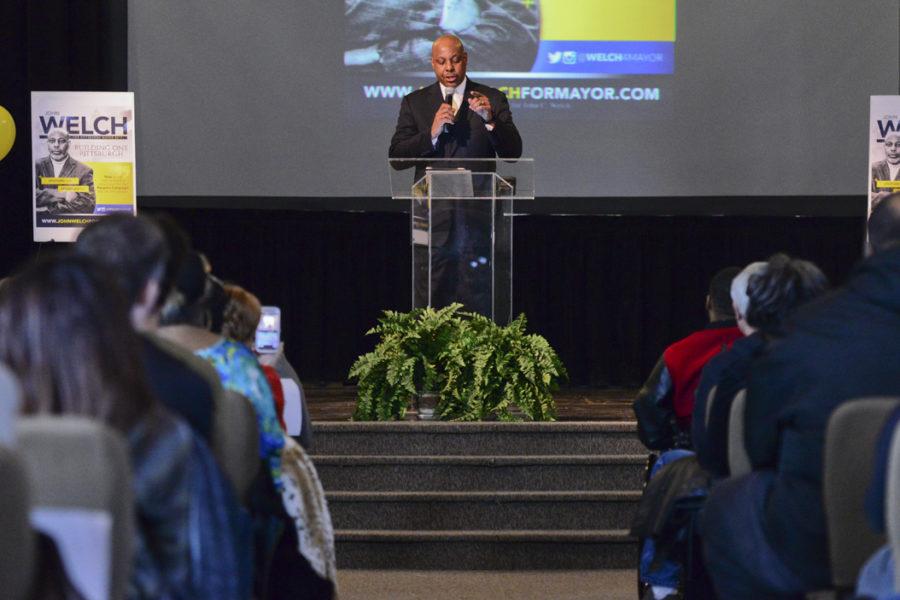For the first time Wednesday night, all three of Pittsburgh’s Democratic mayoral candidates took to the same stage.
Live on WTAE, City Councilperson Darlene Harris, Rev. John Welch and current Mayor Bill Peduto traded opinions, arguments and occasional barbs in a fight for Pittsburghers’ votes in the primary May 16.
The minute long answers sometimes left candidates lost for words or presenting unclear opinions, but three topics showed clear differences — how to fix the Pittsburgh Water and Sewer Authority, when to release police body camera footage and whether Pittsburgh should be a sanctuary city.
Darlene Harris
While the veteran councilperson said she was disappointed she didn’t get a chance to bring up her hatred of bike lanes, she did put her moderate view of governing on display. Harris focused more on fixing potholes and strong policing instead of longer term issues like housing developments.
Harris, who represents much of North Side, said the reason for the PWSA’s myriad issues — from lead in the water to overbilling — is mismanagement. She asserted that under Peduto, the authority let go of too many employees, leading to less expertise and overstretched staff.
Harris also said she supported a bill currently in the Pennsylvania House that would give police final say on the release of body camera footage.
“We have to trust our police, we have to trust our law enforcement,” Harris said.
And on sanctuary cities, while she expressed her support for immigrants, she rejected the notion that the city should risk losing any funding by refusing to cooperate with federal authorities to deport undocumented immigrants.
“We cannot afford for the people that live in Pittsburgh to lose any of our federal or state funds,” Harris said.
John Welch
Welch, a social activist and dean of students at the Pittsburgh Theological Seminary, hit Peduto hard, calling Uber, a company Peduto has partnered with, an “unethical corporation” and questioning his fundraising from Pittsburgh developers.
That disagreement carried over to his solutions for the city’s problems. Welch stressed the threat that lead in the water posed to Pittsburghers, and compared the city’s water situation to Flint, Michigan — a city whose crisis was so bad it became a state and federal disaster area.
To solve the problem, Welch, who has never held elected office, advocated the city proclaim a state of emergency and provide filters to every resident — a solution Peduto has announced but has yet to implement.
On body cameras, Welch, who marched in Ferguson during the controversy surrounding the shooting death of Michael Brown by police, was adamant for transparency.
“It should absolutely be made available to the public,” he said of body camera footage.
And on Pittsburgh becoming a sanctuary city, Welch was fully in favor, saying, “Pittsburgh police will not act as an extension of ICE [Immigration and Customs Enforcement].”
Bill Peduto
As for the incumbent, Peduto spent the night firing back at Welch’s quips. When the reverend claimed he gave out a specific tax credit “like Tic Tacs” to developers, Peduto responded he’d only given one. After Welch decried autonomous vehicles for taking away jobs, Peduto made clear that resistance to automation was futile.
“The question of whether automobiles are going to become shared, autonomous and electric, it is not debatable,” the mayor said.
On the PWSA, Peduto claimed the authority needed more investment, and that the lead in the water was a result of “bad infrastructure.” He also thought Welch was overstating the extent of Pittsburgh’s problem with a Flint comparison.
Peduto sought to find middle ground between Welch and Harris on body cameras. The 12-year City Council veteran said while he backed the release of police body camera footage, he thought police had some right to hold footage in special situations — though he didn’t clarify any criteria.
When asked if Pittsburgh should be a sanctuary city, Peduto said that in practice, Pittsburgh already was — regardless of any official proclamations.
“It’s not just following [the policies of a] sanctuary city,” he said. “It’s following the constitution of the United States.”


